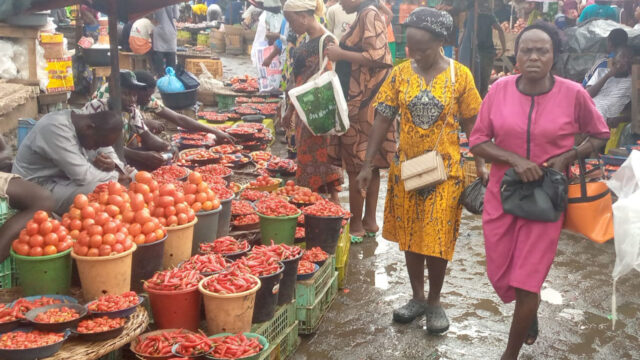Nigeria’s headline inflation rate has reached a staggering 33.88% in October 2024, according to the latest report from the National Bureau of Statistics (NBS). This represents a 1.18 percentage point increase compared to the 32.70% recorded in September 2024.
The NBS Consumer Price Index (CPI) and Inflation Report, released on Friday, paints a bleak picture of the country’s economic situation. On a year-on-year basis, the headline inflation rate in October 2024 was 6.55 percentage points higher than the 27.33% recorded in October 2023, indicating a significant deterioration in the purchasing power of Nigerian consumers.
Per the report, the increase in the headline index for October 2024 on a year-on-year and month-on-month basis was attributed to the increase in some items in the basket of goods and services at the divisional level. These increases were observed across a wide range of sectors, including food and non-alcoholic beverages, housing, utilities, clothing, transportation, furnishings, education, health, and miscellaneous goods and services.
The report highlighted that on a month-on-month basis, the headline inflation rate in October 2024 stood at 2.64%, a 0.12 percentage point increase compared to the 2.52% recorded in September 2024. This suggests that the rate of price increases accelerated in the month of October, putting further strain on households and businesses.
The percentage change in the average CPI for the 12 months ending October 2024 over the average CPI for the previous 12 months was 32.26%, indicating an 8.82 percentage point increase compared to the 23.44% recorded in October 2023,” the report revealed, underscoring the sustained inflationary pressures over the past year.
Food Inflation Hits 39.16%, Driven by Rising Prices of Key Commodities
The NBS report also sheds light on the alarming rise in food inflation, which soared to 39.16% on a year-on-year basis in October 2024 – a 7.64 percentage point increase compared to the 31.52% recorded in October 2023. This surge was primarily driven by the rising prices of staple food items such as guinea corn, rice, maize, beans, yam, water yam, cocoyam, palm oil, vegetable oil, and various processed food products.
On a month-on-month basis, the food inflation rate in October 2024 stood at 2.94%, a 0.30 percentage point increase compared to the 2.64% recorded in September 2024. The report attributes this to the rising prices of items like palm oil, vegetable oil, mudfish, croaker, fresh fish, dried beef, goat meat, mutton, skin meat, bread, guinea corn flour, plantain flour, and rice.
Core Inflation Reaches 28.37%, Excluding Energy and Agricultural Produce
The report also looks into the core inflation rate, which excludes the prices of volatile agricultural produce and energy. The core inflation rate metric stood at 28.37% in October 2024 on a year-on-year basis, representing a 5.79 percentage point increase compared to the 22.58% recorded in October 2023.
The NBS attributed this rise in core inflation to significant price hikes in various service sectors, including bus journeys within the city, journeys by motorcycle, bus journeys intercity, rent, meals at local restaurants, haircut services, women’s hair brushes, and hairdressing. The exclusion of petrol prices from this metric is due to the deregulation of the commodity following the removal of subsidies.
On a month-on-month basis, the core inflation rate was 2.14% in October 2024, a 0.04 percentage point increase compared to the 2.10% recorded in September 2024. The average 12-month annual core inflation rate for the period ending October 2024 stood at 26.12%, which was 6.14 percentage points higher than the 19.98% recorded in October 2023.
Urban and Rural Inflation Rates Diverge, with Urban Areas Hit Harder
In the report’s analysis of regional disparities in inflation rates across Nigeria, on a year-on-year basis, the urban inflation rate in October 2024 was 36.38%, which was 7.09 percentage points higher compared to the 29.29% recorded in October 2023. In contrast, the rural inflation rate stood at 31.59%, a 6.01 percentage point increase from the 25.58% recorded in the same period.
Similarly, on a month-on-month basis, the urban inflation rate was 2.75%, representing a 0.08 percentage point increase compared to September 2024’s 2.67%. The rural inflation rate was 2.53%, which increased by 0.14 percentage points from the 2.39% recorded in the previous month.
The report’s state-level analysis revealed that in October 2024, the highest year-on-year inflation rate was in Bauchi at 46.68%, followed by Kebbi at 40.02% and Sokoto at 39.65%. Conversely, the slowest rise in headline inflation on a year-on-year basis was recorded in Delta at 27.85%, Benue at 28.22%, and Katsina at 29.59%.
On a month-on-month basis, the highest inflation rate was observed in Kano at 3.77%, Bauchi at 3.74%, and Anambra at 3.59%. The states with the slowest month-on-month inflation increases were Kwara at 1.27%, Ondo at 1.49%, and Lagos at 1.91%.
The report paints a grim picture of Nigeria’s economic climate, with inflation reaching levels not seen in many years. The sustained and broad-based increases in prices across various sectors, particularly in food and core items, have severely eroded the purchasing power of Nigerian consumers, exacerbating the country’s cost of living crisis. The Tinubu administration will now face mounting pressure to implement effective measures to rein in inflation and provide relief to households and businesses grappling with the consequences of this inflationary spiral.

Leave a Reply